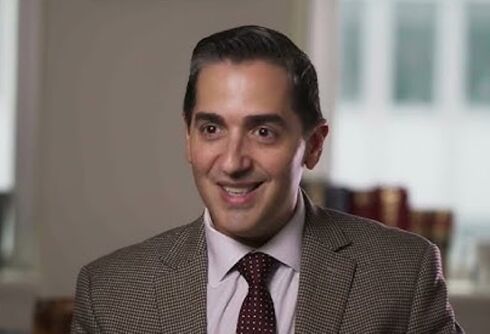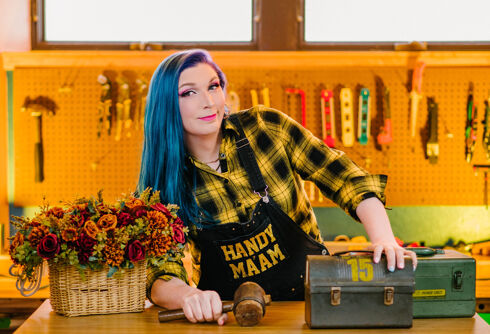There’s a funny scene in the Netflix series Glamorous where Miss Benny, the gender non-conforming lead, asserts himself, declaring, “I’m a twink on PrEP. I can do anything.”
The same could be said for Zachary Zane, the lead in his own glamourous, sex-soaked workplace dramedy called Boyslut. The Lolli-stamped collection of content — a digital zine, sex columns in Men’s Health, Cosmo and Queer Majority, and a new book by the same name — is all based on Zane’s firsthand experience as a bi, Jewish, self-described “slut.”
Related:
Hundreds of people form human shield around library to block anti-LGBTQ+ protestors
“We will never allow the far right to stand unopposed on our streets.”
While the 33-year-old has edged past twink into twunk since he started his PrEP-fueled sexual odyssey, he still plays the satyr: a 6’3″ unsheathed and hairy-chested young man for all sexes.
Never Miss a Beat
Subscribe to our newsletter to stay ahead of the latest LGBTQ+ political news and insights.
I caught up with the author this summer to talk about his new “memoir and manifesto” on the occasion of the book’s publication, when we both had colds. That put a pause on Zane’s collection of new material and leveled the playing field a little with his interviewer, whose apps in a rural area north of San Francisco lack the instant gratification afforded Zane at home in Brooklyn overlooking Prospect Park.

LGBTQ Nation: Do folks like to talk about their sex lives with you when they find out your line of work?
Zachary Zane: It is wild. If I say I’m a sex columnist while meeting someone out, like, they will delve into the most personal sexual experience they’ve had, or their intimacy issues or whatever they’re struggling with. They’re opening up to a complete stranger, you know what I mean? It really shows that people do not have an outlet to discuss their sex lives in the way that I think they really want to. They don’t have people they can trust or they’re so worried about being shamed. They need someone who won’t shame them, and they just kind of bare their souls.
LGBTQ Nation: You come at your subject in the book as someone who, in your own description, has had severe mental health issues in the past. What’s your mental health like these days?
ZZ: I mean, the state of the world is burning at any given moment, but I’m a lot better. And it’s because of medication. It’s because of therapy. It’s because of reading books and educating myself. And it’s because I’ve found — this phrase is really overused — my chosen family. And I really do feel like I have support and a community, which makes me feel so much less alone, so much less shame, so much less isolation. So, I still have anxiety. I feel like, how can you be a Millennial and not have anxiety at this point?
LGBTQ Nation: Do you have a therapist you like?
ZZ: I finally found a therapist who I really love and she’s been super helpful. She is this older Jewish woman, maybe in early 70s? She’s so blunt and so aggressive and direct with me in a way that actually most therapists are not and the way that an advice columnist is, and she will straight up be like, “You should break up with him. He sounds like a piece of shit,” which most therapists don’t do. And I’m like, “All right. I like it.” And obviously being Jewish, I’m familiar with a strong female Jewish archetype that actually makes me feel comfortable in sharing.
LGBTQ Nation: In the book you go off on the idea of “bi-visibility.” What is it about the term “visibility” that bothers you?
ZZ: It’s just kind of hailed as this panacea that fixes everything. And, like, visibility is important, but it’s just the first step of activism. We need to go beyond visibility. And I feel like right now — I actually wrote a piece for Cosmo about this — I feel like bisexual activists have been focusing on visibility for forever, because that was the stage that we were in in the world. And as a community, I’m like, “Okay, we obviously still need more visibility, but we actually are becoming more visible, so what’s next?” Visibility cannot be the end game.
LGBTQ Nation: To your point, when you do a photo shoot with a bunch of plus-size Black models, you know exactly who you’re making more visible, but how do you do that with bi people?
ZZ: That’s where I wrote about bisexual “audibility,” because it’s really challenging to be visibly bisexual, and what does that mean? How do you depict that? Like, unless you have a man and woman on your arm, both kissing and you’re in a polyamorous throuple, it’s really hard to be visibly bisexual. And while that sounds amazing to me (laughing), I know that that’s not what every single bisexual person wants.
If you’re a man dating another man, you’re perceived as gay; a man dating a woman, you’re perceived as straight. You can’t be really in a “bisexual relationship.” You’re a “bisexual person in a relationship.” That’s why you really need bisexual audibility — actually saying you are bisexual, talking about bisexuality, because we can’t be visible the same way. We have to be loud and obnoxious and annoying about it, which we are, and I think that’s important.
LGBTQ Nation: Is sexuality an evolution or do you think it’s stamped onto our genome from the start and we just need to figure out what it is?
ZZ: I think it’s different for each person. I think there are certain people from a very young age, they kind of know their sexual desires and what it is and that remains consistent throughout their entire life. Whether that is, you’re gay and you’re a bottom and you were always gay and you were always a bottom and you like what that is, that’s great.
But then, I think for some people, it does evolve over time. Especially when you are more sexually fluid. I think desires can change and grow. And I think in the LGBTQ community, we were initially very reticent to admit that, right? Because we knew that religious zealots and Republicans and anti-LGBTQ crusaders would then use that to be like, “Oh, you’re gay? Well, you can evolve and be straight.” So we were very cautious. We were very particular in picking the Born This Way narrative. It’s like, “No, this is who we are. We’re not gonna change.”
I think we kind of messed up. And I think, like, what if being gay was a choice? There’s nothing wrong with being gay. Like, I don’t think we need to validate being gay or queer or bisexual or anything by being like, “Oh, it’s because it’s not a choice and therefore it’s okay.” If you picked and chose to be gay, great. Who cares? There’s nothing wrong with being gay.
LGBTQ Nation: What kind of long-term relationship do you see for yourself in 10 years?
ZZ: I see myself ending up with my primary partner being a man. At least right now it’s very important for my queer identity, to be perceived as queer. And also even when I date women, no matter how kind of queer both of us are, we end up falling into traditional gender roles, no matter how hard we try not to.
That’s just my experience. Other people have it different ways, but I see myself hopefully married to a man in a polyamorous open relationship type-deal. And then we have friends we hook up with and more casual partners, but I have this really strong connection, kind of my ride or die, and then we’re both having fun with other people separately and together.
LGBTQ Nation: Would it be important to you to be with someone who was bisexual?
That’s just how it ends up, you know what I mean? I’ve obviously dated gay men and I love it. But considering my life is so bi and we go to bi sex parties and stuff like this, I want my partner to be able to participate in those spaces.
LGBTQ Nation: How do you know you’re bisexual?
ZZ: When that question is asked of me, I kind of make the argument that it’s trying too often to disprove my bisexuality. But how do I know? I’m bisexual because I want to fuck and date and love people of all genders. That’s how I know I’m bisexual.
LGBTQ Nation: In the book, you address the charge, “Bisexuality is transphobic.” What’s that about?
ZZ: Yeah, so there was this idea that bisexuality perpetuates a kind of gender binary, right? And for whatever reason, people assume that bisexual men are only attracted to cis men and cis women. And I’m like, that’s absurd. First of all, the fact that you’re just assuming cis men and cis women means that you’re not considering trans men men, and trans women women. Like you’re actually the one that’s being transphobic.
When the word bisexual came out, we did not have this understanding of gender that we do now. Clearly this was not meant to be exclusive. And you also notice that trans people and nonbinary people are typically not the ones to say that bisexuality is transphobic. That’s because bi people are the ones dating non-binary and trans people openly! So it’s often well-intentioned people getting offended on behalf of a community that’s not actually offended themselves.
LGBTQ Nation: What’s the best part of being bisexual?
Oh my God, now that I have my community it’s absolutely awesome. I mean, I obviously enjoy the sex. I think that goes without saying. But I really think being bisexual, in a way, changed my life, where I no longer see the world in black and white. I no longer dichotomize things the way that other people do. I kind of can see the shades of grey.
I understand this fluidity. And I feel like this fluidity and openness in my sexuality, honestly, is a fluidity and openness in other aspects of my life that are not sexual, and just that it really influences my outlook on the world. And I love having this outlook on the world. I think it makes it more nuanced. And fun. And enjoyable.
Don't forget to share:















